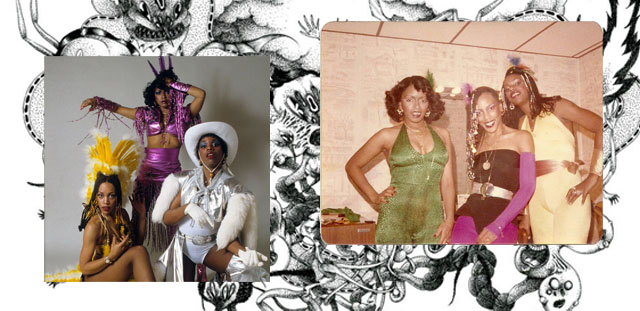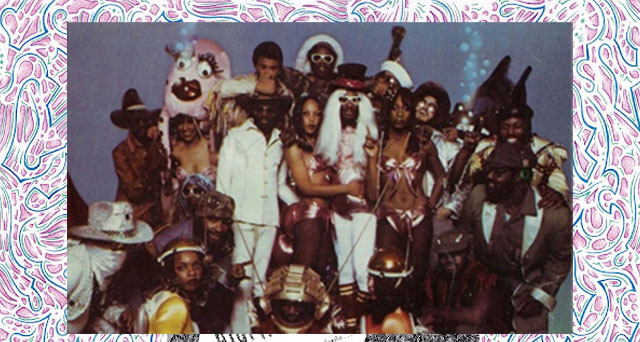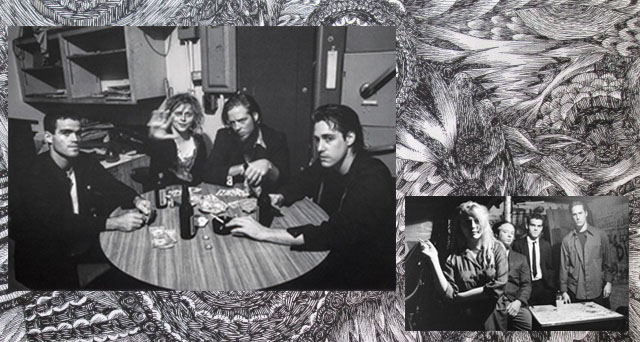Esta cuarta entrega viene de la mano de JOSE ATOMIZADOR y nos envía CUATRO CANCIONES PARA TRASCENDER Y ESCAPAR DE LA REALIDAD.

JOSE HAZ/ATOMIZADOR, es un músico marginal y editor de los fanzines subculturales HAZ y Manchas Ruido.
Lleva más de dos décadas creando prolíficamente hermosa música, repleta de ideas, colores y sabores. Igualmente es un dibujante tenaz que ha generado un universo propio, tan delicado, bello y minucioso como perturbador. Jose es un militante insobornable del Arte libre y el Underground, donde pasan las cosas que de verdad importan.
www.afeitealperro.blogspot.com
https://www.instagram.com/afeitealperro/

Item #1 BRIDES OF FUNKENSTEIN “NEVER BUY TEXAS FROM A COWBOY”(1979)
En el universo P-Funk, las canciones inmortales se cuentan por decenas (el único grupo igual de increíblemente prolífico que me viene a la mente ahora mismo son los Beatles), por lo que es fácil centrarse en los discos más célebres (iconos del siglo XX como “Maggot Brain” o “Mothership Connection”) y pasar por encima de cosas tan alucinantemente maravillosas como el primer tema del segundo disco de Brides of Funkenstein.
Lynn Mabry y Dawn Silva fueron coristas de Sly and the Family Stone hasta que en 1977 conocieron a George Clinton y se unieron a la familia Parliament/Funkadelic, pasando de un combo tóxico a una verdadera farmacia ambulante e inmortalizando sus increíbles voces en algunos de los mejores discos de finales de los años 70. En 1979 sacaron su segundo disco como “Brides of Funkenstein”, cuyo primer tema es este monstruo explosivo de 15 minutos con todo el colectivo (Bootsy Collins, Bernie Worrell, Eddie Hazel, Dennis Chambers…algunos de los músicos más brillantes que han pisado este planeta) acompañando la voz cósmica de Dawn Silva en un estribillo-bucle infinito que podría escuchar durante horas y le da cien mil vueltas a los (casi siempre plomizos) experimentos fluxus de la vanguardia neoyorquina con las largas duraciones.
In the P-Funk universe, immortal songs abound by the dozens (the only other group that comes to mind for being equally incredibly prolific is The Beatles), making it easy to focus on the most famous albums (such as 20th-century icons like 'Maggot Brain' or 'Mothership Connection') and overlook incredibly wonderful gems like the opening track of the second album by Brides of Funkenstein.
Lynn Mabry and Dawn Silva were backing vocalists for Sly and the Family Stone until they met George Clinton in 1977 and joined the Parliament/Funkadelic family, transitioning from one inebriating band to a true traveling pharmacy, immortalizing their incredible voices on some of the best albums of the late 1970s. In 1979, they released their second album as 'Brides of Funkenstein,' with its first track being this explosive 15-minute monster featuring the entire collective (including Bootsy Collins, Bernie Worrell, Eddie Hazel, Dennis Chambers, some of the most brilliant musicians to have walked this planet) accompanying Dawn Silva's cosmic vocals on an endlessly looping chorus that could be listened to for hours, far surpassing the (often ponderous) Fluxus experiments of the New York avant-garde with their long durations.

Item #2 PARLIAMENT/RUTH COPELAND “THE SILENT BOATMAN” (1970)
“Osmium”, el primer LP de Parliament, es un disco atípico dentro de la discografía del colectivo P-Funk. Mucho menos desquiciado que algunas de sus obras posteriores, se asemeja más a los primeros discos de Funkadelic y contiene algunos temas con influencia country y folk consecuencia directa de la participación de Ruth Copeland, música británica que formó parte del entorno Clinton a principios de los 70.
Los tres buenísimos temas que Copeland compuso para “Osmium” son probablemente las canciones menos funkies que grabaron Parliament en toda su carrera. “Little Ole Country Boy” suena exactamente como su título indica (con arpa de boca, pedal steel guitar y “yodelling” incluidos), “Oh Lord, Why Lord Prayer” es una versión power-soul del ultrafamosísimo Canon de Pachelbel (no puedo evitar acordarme del “I got to tell you” de Dr. Octagon cada vez que la pongo), y por último, “The Silent Boatman”, que cierra el disco (imposible continuar después de algo así), es una de las canciones más emocionantes y luminosas de la música moderna, con un sonido tan lleno de vida y puro sentimiento que sorprende que hable de la muerte. Gaitas, el órgano omnipresente de Worrell y las mejores voces de la historia elevando estratosféricamente una preciosa composición (la versión de Ruth Davenport es bonita, pero no tiene el peso espiritual cósmico de la de Parliament). Los últimos dos minutos, con todos los vocalistas alternando en cadena el estribillo sobre un colchón de voces angelicales in crescendo son absolutamente irreales, un auténtico nirvana sónico que demuestra la grandeza artística que pueden alcanzar los seres humanos.
Osmium," the first LP by Parliament, is an atypical album within the P-Funk collective's discography. It is much less eccentric than some of their later works and resembles more the early albums of Funkadelic, containing some country and folk-influenced tracks as a direct result of the involvement of Ruth Copeland, a British musician who was part of the Clinton circle in the early 1970s.
The three excellent songs that Copeland composed for "Osmium" are probably the least funky songs Parliament ever recorded. "Little Ole Country Boy" sounds exactly as its title suggests (complete with mouth harp, pedal steel guitar, and yodeling), "Oh Lord, Why Lord Prayer" is a power-soul version of the ultra-famous Canon by Pachelbel (I can't help but think of Dr. Octagon's "I got to tell you" every time I listen to it), and finally, "The Silent Boatman," which closes the album (impossible to continue after something like that), is one of the most moving and luminous songs in modern music, with a sound so full of life and pure emotion that it's surprising it's about death. Bagpipes, Worrell's omnipresent organ, and the best voices in history elevating the composition to stratospheric heights (Ruth Davenport's version is beautiful, but it lacks the cosmic spiritual weight of Parliament's version). The last two minutes, with all the vocalists alternating the chorus in a chain over a crescendo of angelic voices, are absolutely surreal, a true sonic nirvana that demonstrates the artistic greatness that humans can achieve.

Item #3 LAUGHING HYENAS “GABRIEL” (1987)
Laughing Hyenas fue el grupo que formaron a mediados de los 80 John Brannon (Negative Approach) y la tristemente desaparecida Larissa Strickland (L-Seven), dos de las más importantes personalidades de la primigenia escena hardcore de Detroit. Desde su primer disco, sonaban como un cruce entre The Birthday Party y el vocalista de hardcore más iracundo del mundo (con el permiso de la voz de “padre decepcionado” de Ian MacKaye). Tras cuatro discos apoteósicos (el último, “Hard Times”, puede resultar “complicado” para la gente a la que no le gusten los Rolling Stones), la banda implosionó por el uso de drogas duras, pero su legado marcó a gente como Sonic Youth, Tad y Nirvana (dice la leyenda que estos últimos escogieron a Butch Vig para “Nevermind” por su labor en los discos de LH).
“Gabriel”, mi canción favorita de ellos, suena como una toma extra embrutecida del “Funhouse” de los Stooges . Tres acordes de guitarra que suenan como un enjambre de avispas, batería y bajo minimales, una trompeta anunciando el apocalipsis y una de las voces más salvajes de la historia del rock’n’roll. Música para mis oídos. ucturación de la creativa.
Laughing Hyenas was the band formed in the mid-80s by John Brannon (from Negative Approach) and the late Larissa Strickland (from L-Seven), two of the most important figures in the original hardcore scene in Detroit. From their first album, they sounded like a cross between The Birthday Party and the angriest hardcore vocalist in the world (with Ian MacKaye's "disappointed father" voice as the only exception). After four monumental albums (the last one, "Hard Times," may be "challenging" for people who don't like The Rolling Stones), the band imploded due to drug use, but their legacy left a mark on bands like Sonic Youth, Tad, and Nirvana (legend says that Nirvana chose Butch Vig for "Nevermind" based on his work on Laughing Hyenas' albums).
"Gabriel," my favorite song of theirs, sounds like a more brutal outtake from The Stooges' "Funhouse." Three guitar chords that sound like a swarm of wasps, minimal drums and bass, a trumpet announcing the apocalypse, and one of the wildest voices in the history of rock'n'roll. Music to my ears.

Item #4 THE LANGLEY SCHOOLS MUSIC PROJECT “GOD ONLY KNOWS” (1977)
Decir que “God Only Knows” es una de las canciones más bellísimas de la historia no es nada nuevo. La canción favorita de Paul McCartney, una de las codas pop más emocionantes del mundo, una melodía PERFECTA sobre una armonía de belleza espectral neoclásica, ese primer verso desconcertante (“I may not always love you”)…el epítome del pop barroco y uno de los mayores ejemplos del genio sobrehumano de Brian Wilson antes de caer en desgracia para siempre. Intentar versionarla es algo que sólo puede terminar en fracaso, como demostraron Flaming Lips hace unos años.
Los niños y niñas del Langley School District (Canadá), dirigidos por su profesor de música Hans Ferger, grabaron en 1976 y 1977 dos discos de versiones de clásicos pop y rock que tocaban por diversión y que prensaron en diminutas tiradas como souvenir para ell@s y sus allegad@s. En el año 2000, un coleccionista llamado Brian Linds encontró los discos en una tienda de segunda mano, se los envió a Irwin Chusid (autor de “Songs in the Key of Z” y uno de los grandes defensores de la mal llamada “música outsider”) y se produjo el milagro: reedición para todos los públicos de esas increíbles grabaciones, críticas positivas en todos los grandes medios musicales, declaraciones de Bowie sobre la versión de su “Space Oddity”…un pequeño “hype” completamente merecido, porque tras escuchar la música de estas niñas y niños, las canciones originales suenan impostadas y sobreproducidas. Es especialmente doloroso el contraste entre las preciosas y sinceras voces infantiles (sin vibratos, falsa emotividad ni desmadres melismáticos) y las voces de los temas originales (convertir el horripilante “Mandy” de Barry Manilow en una obra maestra pop es una proeza musical al alcance de pocos).
En un mundo perfecto, este disco sonaría en todas las escuelas de música. Arte libre hecho por el mero placer de tocar junt@s y divertirse. Ferger y sus ciento y pico alumn@s consiguieron la belleza del “wall of sound” de Phil Spector con un par de micrófonos en un gimnasio, algo absolutamente inaudito. Y lo hicieron sin ningún interés ni motivo externo a la propia música. Quizás justo por eso estas grabaciones suenas tan MÁGICAS y perfectas.
To say that "God Only Knows" is one of the most beautiful songs in history is nothing new. Paul McCartney's favorite song, one of the most emotionally charged pop codas in the world, a PERFECT melody over a spectral neoclassical harmony, that disconcerting first verse ("I may not always love you")...the epitome of baroque pop and one of the greatest examples of Brian Wilson's superhuman genius before he fell from grace forever. Trying to cover it is something that can only end in failure, as Flaming Lips demonstrated a few years ago.
The boys and girls of the Langley School District (Canada), under the direction of their music teacher Hans Ferger, recorded two albums of covers of pop and rock classics in 1976 and 1977 that they played for fun and pressed in tiny runs as souvenirs for themselves and their loved ones. In the year 2000, a collector named Brian Linds found the albums in a second-hand store, sent them to Irwin Chusid (author of "Songs in the Key of Z" and one of the great advocates of so-called "outsider music"), and the miracle happened: a reissue for all audiences of these incredible recordings, positive reviews in all major music media, and Bowie's praise for their version of his "Space Oddity"... A small but completely deserved "hype," because after listening to the music of these girls and boys, the original songs sound artificial and overproduced. The contrast between the beautiful and sincere children's voices (without vibrato, false emotionality, or melismatic excesses) and the voices on the original songs is especially striking (turning Barry Manilow's horrendous "Mandy" into a pop masterpiece is a musical feat within the reach of few).
In a perfect world, this album would be played in every music school. Free art made for the pure pleasure of playing together and having fun. Ferger and his hundred-plus students achieved the beauty of Phil Spector's "wall of sound" with just a couple of microphones in a gym, something absolutely unheard of. And they did it without any external interest or motive other than the music itself. Perhaps that's why these recordings sound so MAGICAL and perfect.
![]()
Decir que “God Only Knows” es una de las canciones más bellísimas de la historia no es nada nuevo. La canción favorita de Paul McCartney, una de las codas pop más emocionantes del mundo, una melodía PERFECTA sobre una armonía de belleza espectral neoclásica, ese primer verso desconcertante (“I may not always love you”)…el epítome del pop barroco y uno de los mayores ejemplos del genio sobrehumano de Brian Wilson antes de caer en desgracia para siempre. Intentar versionarla es algo que sólo puede terminar en fracaso, como demostraron Flaming Lips hace unos años.
Los niños y niñas del Langley School District (Canadá), dirigidos por su profesor de música Hans Ferger, grabaron en 1976 y 1977 dos discos de versiones de clásicos pop y rock que tocaban por diversión y que prensaron en diminutas tiradas como souvenir para ell@s y sus allegad@s. En el año 2000, un coleccionista llamado Brian Linds encontró los discos en una tienda de segunda mano, se los envió a Irwin Chusid (autor de “Songs in the Key of Z” y uno de los grandes defensores de la mal llamada “música outsider”) y se produjo el milagro: reedición para todos los públicos de esas increíbles grabaciones, críticas positivas en todos los grandes medios musicales, declaraciones de Bowie sobre la versión de su “Space Oddity”…un pequeño “hype” completamente merecido, porque tras escuchar la música de estas niñas y niños, las canciones originales suenan impostadas y sobreproducidas. Es especialmente doloroso el contraste entre las preciosas y sinceras voces infantiles (sin vibratos, falsa emotividad ni desmadres melismáticos) y las voces de los temas originales (convertir el horripilante “Mandy” de Barry Manilow en una obra maestra pop es una proeza musical al alcance de pocos).
En un mundo perfecto, este disco sonaría en todas las escuelas de música. Arte libre hecho por el mero placer de tocar junt@s y divertirse. Ferger y sus ciento y pico alumn@s consiguieron la belleza del “wall of sound” de Phil Spector con un par de micrófonos en un gimnasio, algo absolutamente inaudito. Y lo hicieron sin ningún interés ni motivo externo a la propia música. Quizás justo por eso estas grabaciones suenas tan MÁGICAS y perfectas.
To say that "God Only Knows" is one of the most beautiful songs in history is nothing new. Paul McCartney's favorite song, one of the most emotionally charged pop codas in the world, a PERFECT melody over a spectral neoclassical harmony, that disconcerting first verse ("I may not always love you")...the epitome of baroque pop and one of the greatest examples of Brian Wilson's superhuman genius before he fell from grace forever. Trying to cover it is something that can only end in failure, as Flaming Lips demonstrated a few years ago.
The boys and girls of the Langley School District (Canada), under the direction of their music teacher Hans Ferger, recorded two albums of covers of pop and rock classics in 1976 and 1977 that they played for fun and pressed in tiny runs as souvenirs for themselves and their loved ones. In the year 2000, a collector named Brian Linds found the albums in a second-hand store, sent them to Irwin Chusid (author of "Songs in the Key of Z" and one of the great advocates of so-called "outsider music"), and the miracle happened: a reissue for all audiences of these incredible recordings, positive reviews in all major music media, and Bowie's praise for their version of his "Space Oddity"... A small but completely deserved "hype," because after listening to the music of these girls and boys, the original songs sound artificial and overproduced. The contrast between the beautiful and sincere children's voices (without vibrato, false emotionality, or melismatic excesses) and the voices on the original songs is especially striking (turning Barry Manilow's horrendous "Mandy" into a pop masterpiece is a musical feat within the reach of few).
In a perfect world, this album would be played in every music school. Free art made for the pure pleasure of playing together and having fun. Ferger and his hundred-plus students achieved the beauty of Phil Spector's "wall of sound" with just a couple of microphones in a gym, something absolutely unheard of. And they did it without any external interest or motive other than the music itself. Perhaps that's why these recordings sound so MAGICAL and perfect.

